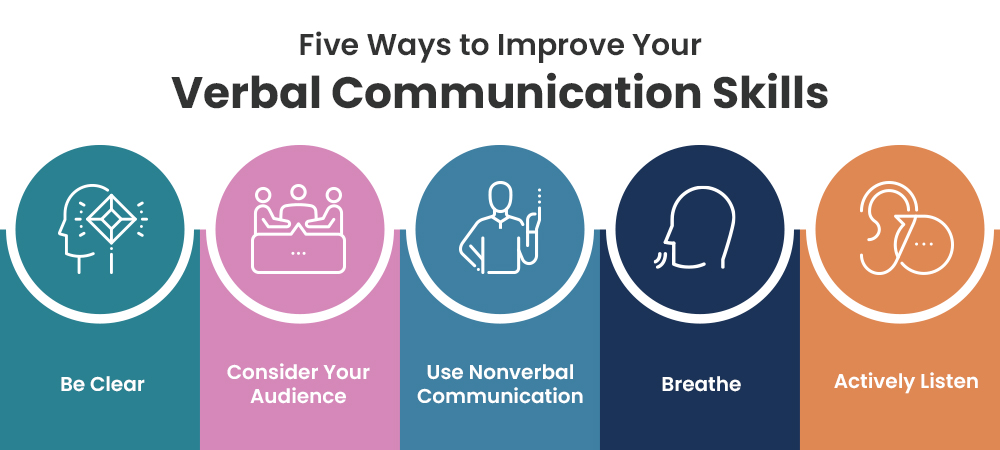
Verbal communication is how we send information or a message to someone else through the words we speak aloud. We use it every day. But with our growing use of smart devices and emails, our verbal communication skills are in decline.
Who hasn’t sent an email to a colleague sitting right next to them? Hands up if you have sent a text that was misunderstood rather than making a quick phone call.
Verbal communication is vital when it comes to getting our point across. It helps to maintain relationships and form new ones. We use it personally and professionally, so we must get it right.
In this blog, we answer the question: what is verbal communication? Starting today, you will also learn why it’s essential and how you can improve your verbal communication skills.
What is Verbal Communication?
Verbal communication involves the exchange of thoughts, feelings and ideas using spoken words. Its effectiveness depends upon various aspects, including the choice of words, tone and clarity of speech.
It is a two-way process in which the speaker transmits information while the listener comprehends and interprets the message.
Verbal and Nonverbal Communication
Verbal communication is oral communication. It’s when we speak aloud. And it’s a two-way process. Meaning it takes both a sender (the person talking) and a receiver (the person listening/receiving the message).
Nonverbal communication can include facial expressions, hand gestures and body language. We often mix verbal and nonverbal communication when we’re trying to express ourselves or convey a message to others.
We can communicate verbally with others over the phone, online on a Zoom call or via FaceTime. But with all the technology and gadgets in the world, nothing beats having face-to-face conversations.

Why Are Verbal Communication Skills Important in the Workplace?
A lack of verbal communication skills can prevent you from having positive and meaningful interactions with others in the workplace. This is because effective verbal communication guarantees everyone is on the same page. It eliminates confusion and misunderstanding.
And remember, it’s a two-way process. So, you and the person receiving your message must understand each other.
- Effective verbal communication in the workplace can:
- Prevent and reduce accidents
- Boost staff morale
- Increase productivity
- Increase results
Five Types of Verbal Communication
The type of verbal communication used refers to where and with whom we communicate. Here are five examples:

1. Intrapersonal Verbal Communication
Intrapersonal communication is our internal dialogue. We all do this. Often, without realising it, we talk to ourselves or have conversations with others in our head. This type of verbal communication is also referred to as inner speech, self-talk, internal discourse and inner experience.
2. Interpersonal Verbal Communication
Interpersonal verbal communication involves two parties like speaking one-on-one with a friend or colleague. Each party listens when the other person is talking to understand what’s being said and respond accordingly.
3. Group Verbal Communication
This is where more than three people are involved in a conversation. There may be more people this time but the same rules apply as with interpersonal communication. Each person has a chance to speak, while others listen and respond at the right time.
4. Public Verbal Communication
Public verbal communication can be anything from speaking aloud at a school assembly to being a keynote speaker at a conference. It’s communicating to an audience of people who have come to hear what you have to say. This form of verbal communication takes some people completely out of their comfort zone. But, developing this communication skill can also open new opportunities.
5. Mass Verbal Communication
This is all about talking to the masses. So, think about a TV show with a panel of experts or a podcast where thousands of listeners tune in at the same time. Mass verbal communication involves a small group of speakers who work as a team to share views and ideas with their audience.
The Four Styles of Verbal Communication
People tend to communicate differently. Most academics who study verbal communication categorise it into four styles:
Passive Communication
Passive communicators often avoid expressing their thoughts or feelings for fear of confrontations or offending others. They tend to be the peacekeepers when disagreements happen and appear comfortable and agreeable with other people’s decisions and ideas.
A byproduct of this style of communication is that it can lead to misunderstandings and internalised frustration, which may eventually surface in unhealthy ways. Passive communicators can also be hard to read and rarely make meaningful contributions to group discussions.
Aggressive Communication
Aggressive communicators tend to use harsh or demanding language, expecting to be agreed with. They’re typically direct and show little regard for other people’s feelings.
This style of communication often involves pointing fingers and the use of “You” statements such as “You are wrong” or “You need to do better.” Aggressive communication is largely discouraged as it can create hostility and lead to strained relationships.
Passive-Aggressive Communication
Passive-aggressive communicators express themselves indirectly in an attempt to conceal their true feelings. They might appear to be calm while harbouring negative feelings that manifest in subtle ways.
Just like aggressive communicators, people who practice this style can contribute to hostile and tense environments, as their aggression is never entirely hidden. Passive-aggressive signals such as sarcasm or subtly uncooperative behaviours can confuse and frustrate others, which can eventually lead to confrontations.
Assertive Communication
Assertive communicators balance confidence in what they have to say with respect for other people’s thoughts and feelings. This style of communication enables honest conversations that encourage healthy, constructive interactions.
In contrast with aggressive communication, assertiveness makes use of “I” statements, such as “I feel hurt” or “I need clarity on this,” which express personal feelings without blaming others.
Assertive communication is generally considered the most effective in professional environments. However, it can come across as aggressive in other contexts. With family and close friends, for instance, a passive style may be more considerate.
Switching between different styles of communication is a useful strategy for expressing yourself in different situations.
Five Ways to Improve Your Verbal Communication Skills
You can start improving your verbal communication skills today by using one, some or all of these tips:

1. Be Clear on What You Want to Say
If you have a big meeting, presentation, interview or a complex subject to discuss with someone, it helps to know what you want to say in advance. Grab a pen and paper and write down the topics, keywords and ideas you want to discuss. You may even find brainstorming useful.
If you’re unsure that you have the right tone, ask a friend or colleague to review things.
2. Take Your Audience into Consideration
We adapt how we communicate with others for a variety of reasons. Our opening communication, which is basically the first impression we give to the other party, needs to be on point. Considering our audience allows us to pitch the conversation at the right level.
- Who are you verbally communicating with?
- Is it a colleague?
- Are they on the same level as you?
- Are they an employee of yours?
- Do they manage you?
- Are they older or younger than you?
It also helps to decide on the right tone and even the environment for the discussion.
Before a conversation, consider the receiver and how best they’ll receive your words.
3. Don't Forget About Nonverbal Communication
Body language is just as powerful, if not more so, than our words. While our mouths may say one thing, our bodies may say something completely different.
Folded arms, fidgeting and not maintaining eye contact can show we may lack confidence in our words. It can portray nervousness, boredom and even aggression.
Maintaining eye contact and a neutral posture, smiling when greeting someone and being mindful of your facial expressions are all ways to make the receiver feel comfortable in your presence.

4. Breathe
Verbal communication and public speaking can make people feel anxious. If this is you, it’s perfectly normal. Not everyone is comfortable speaking to an audience. But, it may sometimes be necessary, especially in our professional lives.
If verbal communication makes you break out in a cold sweat, try a breathing exercise before you have to speak. Breathwork does the following:
- Balances blood pressure
- Increases mental focus
- Reduces feelings of anxiety
- Regulates the heart rate
- Releases stress hormones from the body
5. Engage in Active Listening
Active listening is crucial to being an excellent verbal communicator. After all, how do you know how best to respond to someone if you don’t listen to them?
Active listening means giving full attention to the person or people speaking to you. You need to digest and process what they say before you answer. This may involve taking a few seconds to compute things before responding.
Suppose you need clarification on what they have said. In that case, asking them to repeat or explain something will help you verbally communicate your answer better.
Train Yourself to Become a Better Communicator
Everyone can benefit from learning how to communicate better. Communication is vital for getting along with others. Ensuring you have the right verbal communication skills will boost your success in forming and maintaining personal and professional interactions and relationships.
Our Communication Skills training course is perfect for anyone ready to improve. You will learn about the barriers in communication, understand how to communicate with others effectively and why listening skills are also vital.






















































































































































































































































































































































































































































































































































































































































































































































